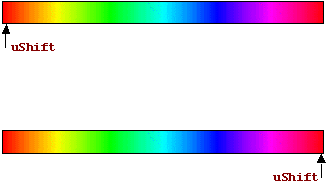
PLASMAINFO
typedef struct tagPLASMAINFO
{
L_UINT uStructSize;
L_UINT uRedFreq;
L_UINT uGreenFreq;
L_UINT uBlueFreq;
L_UINT uOpacity;
L_UINT uShift;
L_UINT uSize;
L_UINT uFlags;
} PLASMAINFO, * pPLASMAINFO;
The PLASMAINFO structure provides information about the color to be used in the LBitmap::PlasmaFilter function.
|
Member |
Description |
|
|
uStructSize |
Size of this structure, in bytes. Use the sizeof operator to calculate this value. |
|
|
uRedFreq |
Value that indicates which frequencies of red color should be used to create plasma patterns. Valid range for the 16, 48, and 64-bit bitmaps is from 0 to 65535 and for 12-bit bitmaps from 0 to 4095. Otherwise, it is from 0 to 255. Use 0 to turn off processing for the red frequencies. |
|
|
uGreenFreq |
Value that indicates which frequencies of green color should be used to create plasma patterns. Valid range for the 16, 48, and 64-bit bitmaps is from 0 to 65535 and for 12-bit bitmaps from 0 to 4095. Otherwise, it is from 0 to 255. Use 0 to turn off processing for the green frequencies. |
|
|
uBlueFreq |
Value that indicates which frequencies of blue color should be used to create plasma patterns. Valid range for the 16, 48, and 64-bit bitmaps is from 0 to 65535 and for 12-bit bitmaps from 0 to 4095. Otherwise, it is from 0 to 255. Use 0 to turn off processing for the blue frequencies. |
|
|
uOpacity |
A percentage value that indicates the amount of blending between the plasma color patterns and the original image. Possible values range from 0 to 100. Use 0 when not using an image, and 100 when not using the plasma values. |
|
|
uShift |
The amount of color shift in the plasma color pattern. Valid range for the 16, 48, and 64-bit bitmaps is from 0 to 65535 and for 12-bit bitmaps from 0 to 4095. Otherwise, it is from 0 to 255. A value of 0 means there is no color shift. |
|
|
uSize |
Value greater than 0 that represents the plasma size. (The value is divided internally by 100). The value, after it has been divided by 100, represents the size in pixels. |
|
|
uFlags |
Flags that indicate which type of plasma effect to create, and which color pattern to use. You can use a bitwise OR (|) to specify one flag from each group. The following flags indicate which type of plasma effect to create: |
|
|
|
Value |
Meaning |
|
|
PLSTYP_VERTICAL |
[0x0000] Create vertical lines of plasma. |
|
|
PLSTYP_HORIZONTAL |
[0x0001] Create horizontal lines of plasma. |
|
|
PLSTYP_DIAGONAL |
[0x0002] Create diagonal lines of plasma. |
|
|
PLSTYP_CROSS |
[0x0003] Create crossed lines of plasma. |
|
|
PLSTYP_CIRCULAR |
[0x0004] Create circles of plasma. |
|
|
PLSTYP_RANDOM1 |
[0x0005] Create randomly shaped plasma. |
|
|
PLSTYP_RANDOM2 |
[0x0006] Create a different type of randomly shaped plasma |
|
|
The following flags indicate which color pattern to use: |
|
|
|
Value |
Meaning |
|
|
PLSCLR_HUE |
[0x0000] Use the first predefined color pattern |
|
|
PLSCLR_RGB1 |
[0x0010] Use the second predefined color pattern. |
|
|
PLSCLR_RGB2 |
[0x0020] Use the third predefined color pattern. |
|
|
PLSCLR_CUST |
[0x0030] Use the frequency members (uRedFreq, uGreenFreq, uBlueFreq) of the PLASMAINFO structure to generate user-defined plasma colors. |
Comments
The uOpacity value will always be considered to be 0, unless specified otherwise by a value between (and including) 0 to 100.
Use the uRedFreq, uGreenFreq, and uBlueFreq members of the PLASMAINFO structure to create a custom color pattern. To use them, pass the PLSCLR_CUST flag to LBitmap::PlasmaFilter. Otherwise, their values will be ignored.
The PLSCLR_HUE value is a predefined color pattern that is based on the HLS color space. It creates plasma patterns by changing hue values.
The PLSCLR_RGB1 value is a predefined color pattern that is based on the RGB color space. Different combinations of red, green and blue frequencies produce different results.
Like the PLSCLR_RGB1 value, the PLSCLR_RGB2 value is based on the RGB color space, but uses a different combination of red, green and blue frequencies.
The color palette used for uShift is a continuous cylindrical color palette. In the following figures, one shows where on the palette a value of 0 lies, and the other one shows where on the palette the maximum value lies:
